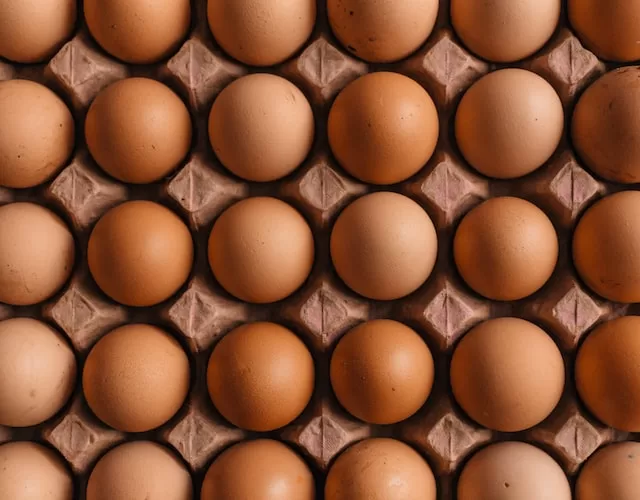Omelettes are cooked in a pan with butter or oil, while scrambled eggs are mostly cooked without any fat. Omelettes also have fillings, such as cheese, vegetables, or meat, while scrambled eggs do not. Scrambled eggs are usually softer than omelettes and can be served with toast, whereas omelettes are usually served without bread.
What are scrambled eggs?
(Image by Gabriel Gurrola on Unsplash)

Scrambled eggs are cooked by whisking them in a bowl with some milk or cream, then pouring the mixture into a hot pan and stirring constantly until they’re set. This method results in fluffy, soft eggs that are often served with toast or other accompaniments.
What are omelettes?
(Image by Eaters Collective on Unsplash)

Omelettes are made by first whisking the eggs in a bowl with some fillings like cheese, vegetables, and/or meat. Then, the mixture is poured into a hot pan and cooked until set on one side before being flipped and cooked on the other side. This produces a firmer egg dish that can be filled with all sorts of delicious ingredients.
Scrambled eggs Vs. Omelettes
There are several key differences between scrambled eggs and omelettes. Perhaps the most obvious difference is in the appearance of the two dishes. Scrambled eggs are usually cooked in a pan with constant stirring, resulting in a soft, fluffy texture. Omelettes, on the other hand, are cooked quickly with very little stirring, resulting in a firmer texture.
Another key difference is in the ingredients used. Scrambled eggs typically just include eggs and milk (or water), while omelettes often include additional ingredients such as cheese, vegetables, and meat. This difference in ingredients results in different flavours for the two dishes – scrambled eggs is more mild-tasting while omelettes can be more flavorful.
Finally, the way that scrambled eggs and omelettes are served can also differ. Scrambled eggs are usually served as is, while omelettes are often folded over or rolled up before being served.
How to make the perfect scrambled egg?
First, you need to whisk your eggs thoroughly. This will ensure that they are evenly cooked and not rubbery. Second, you need to cook them on medium-low heat. If you cook them on too high of heat, they will become dry and crumbly. Third, you need to add some fat. This can be in the form of butter, cream, or even olive oil. This will help to create a smooth and creamy texture. Finally, don’t overdo the stirring. Stirring too much will make your eggs tough. Just gently fold them until they are cooked to your desired consistency.
How to make the perfect omelette?
First, make sure your eggs are fresh – this will make all the difference in the texture and flavour of your omelette. Second, use butter or oil to coat your pan – this will help to create a smooth surface for your eggs to cook on. Third, whisk your eggs thoroughly before adding them to the pan – this will ensure that they cook evenly and smoothly. Finally, don’t be afraid to experiment with different fillings – from cheese and ham to veggies and herbs, there are endless possibilities when it comes to filling your omelette!
How many eggs should go in an omelette or scrambled eggs?
So, how many eggs should you use for each method? When it comes to scrambled eggs, a good rule of thumb is two or three per person. As for omelettes, three eggs should be plenty to make one large serving that’s packed with flavour.
Should you put milk in an omelette?
There are divided opinions on whether or not milk is an acceptable addition to omelettes. Some say that milk makes the omelette more tender and fluffy, while others find that it makes the dish too rich. Ultimately, it comes down to personal preference. You may want to forego the milk if you like your omelettes on the lighter side. However, if you enjoy a heartier breakfast, feel free to add a splash of milk (or even cream!) to your omelette mixture.
How do restaurants make scrambled eggs taste better than homemade ones?
There are a few things that restaurants do to make their scrambled eggs taste better than homemade ones. One is using higher quality ingredients. This might include using fresher eggs, butter, and milk. Another is cooking the eggs at a lower temperature so they are fluffy and creamy. Finally, many restaurants will add some type of seasoning to their scrambled eggs to give them extra flavour.
Are scrambled eggs healthy?
Some people believe that they are a great source of protein and nutrients, while others believe that the high-fat content makes them unhealthy.
Here are some of the pros and cons of eating scrambled eggs:
PROS:
-Scrambled eggs are a quick and easy way to get protein into your diet.
-They are relatively low in calories, especially if you use egg whites only.
-They can be a healthy source of essential nutrients like vitamin D, selenium, and choline.
CONS:
-Scrambled eggs can be high in cholesterol and saturated fat, depending on how they are cooked.
-If you use whole eggs, the yolks contain most of the cholesterol and fat.
Do omelettes have more protein than scrambled eggs?
While both scrambled eggs and omelettes are great sources of protein, omelettes have a bit more protein than scrambled eggs. This is because when you make an omelette, you typically use more eggs than you would for scrambled eggs. And since egg whites are the main source of protein in both dishes, using more egg whites in an omelette will up the protein content.
Is it better to eat boiled eggs or omelettes?
Both boiled eggs and omelettes have their benefits. Boiled eggs are a great source of protein and are very low in calories. Omelettes, on the other hand, are a bit higher in calories but are also a good source of protein.
So, which one is better for you? It depends on your own goals and preferences. If you’re looking for a quick and easy breakfast option, then boiled eggs are probably the way to go. But if you want something more filling and satisfying, then an omelette might be a better choice.
How many eggs should I eat a day?
There is no definitive answer to this question as it depends on a variety of factors, including your age, activity level, and overall health. However, most experts recommend eating anywhere from 1-3 eggs per day. If you are trying to lose weight or lower your cholesterol, you may want to eat fewer eggs.
Featured image by – Erol Ahmed on Unsplash








